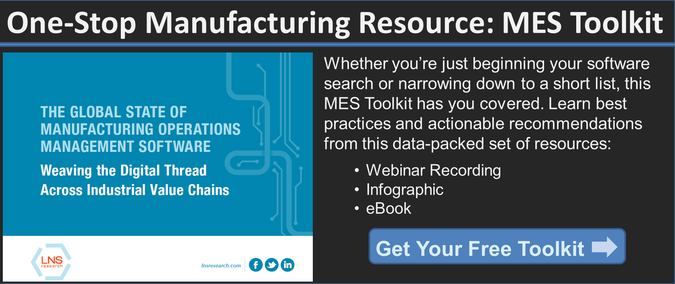Today, not only are many manufacturers across industries dealing with a greater number of operational challenges than in the past, but the rate at which those challenges need to be addressed is increasing as well. This is due to a number of factors like growing customer demands for a greater variety of high-quality products, an increase in industry-specific external regulations, and increased competition.
What this translates to is a need for quicker gains in operational improvements, particularly when it comes to technology improvements, like implementing Manufacturing Execution System (MES) Software or other solutions within the Manufacturing Operations Management (MOM) software category. And fortunately, the vendor landscape is addressing these needs by developing industry-specific, configurable approaches for manufacturers that are helping them get up and running
In this post, we’ll show how the scope of today’s business conditions are contributing to manufacturer’s growing time-to-implement demands, and how this configurable implementation approach based on pre-determined best practices may put them in the best position to achieve timely success.
Changing Business Conditions in Manufacturing
A quick look at our MOM survey (500+) respondents shows the degree and direction of manufacturers’ operational challenges. One question asked respondents to identify the largest changes in business conditions experienced from 2012 into last year.

In short: respondents are saying they need to make a larger number of higher complexity products in less time with more visibility for increasingly fickle customers. It’s no wonder they want improved technology capabilities to bolster operations—and want them fast.
The Benefits of a Configurable Approach
As the MOM software landscape has advanced, new technologies like Cloud, Mobile, Big Data, and IoT are facilitating easier open integration and increased digitization of information. In addition to this, however, solution providers have also begun to tailor applications to better fit the needs of today’s manufacturers—by industry and manufacturing footprint.
A good of example would be a medical device manufacturer that’s heavily burdened by regulations from the FDA and other bodies. For this company, applications like Non-Conformance/Corrective and Preventive Action (NC/CAPA) and Statistical Process Control (SPC) may be absolutely paramount in staying compliant and meeting rigorous quality specifications, whereas a manufacturer of low-cost electronic chips will be much more concerned with maximizing production runs, placing far more emphasis on MES/Production Execution or Planning & Scheduling applications.
In either case, a configurable approach to MOM applications is optimal for manufacturers concerned with implementation times and ROI, as, along with ease of integration, this approach offers “baked-in” best practices that allow manufacturers to quickly start addressing their operational challenges, while still allowing for the flexibility to customize technology to fit the unique characteristics of each company.
Deploying MOM Software Out of the Box
Today we’re seeing a trend of manufacturers that have deployed MOM software and are moving toward a more pre-configured approach—one that is driving many benefits toward ROI justification.

LNS Research recommends most manufacturers aim for approximately 80% out-of-the-box functionality. While the figure above shows that there are more manufacturers down in the 60% out-of-the-box range, currently 32% of manufacturers are taking an 80%+ approach, and this upward trend is positive overall.
Time to Implement—First Instances and Beyond
The advancement in MOM software technology and the trend toward increasingly configurable implementation approaches has, not surprisingly, resulted in a decrease in time to implement software, with the days of instances requiring 24 months or more dwindling.
Looking at both initial and subsequent MOM software implementations we’re seeing notable improvements in time to implement with a large portion of respondents completing implementations in under a year.

Looking at the time to implement initial MOM software we can see that 42% of respondents reported implementations in 12 months or less.

As you might expect, the lessons learned at the initial implementation are carried over to subsequent roll-outs and implementation times are accelerated. However, it’s notable that this number of respondents that successfully rolled out implementations in 12 months or under increases by a full 50% from the initial roll-out. It seems clear that today’s manufacturers are working the kinks out of first-time MOM software implementations effectively.
Understanding the Full Scope of MOM Criteria for Success
While time to implement is an important factor of ultimate ROI and the success of a program there are many other aspects of MOM software and solution providers that need to be given careful consideration before a clear path forward is visible, such as delivery models, proven references and integration partners, support, and more. In order to help manufacturers with this journey, LNS Research has put together a one-stop toolkit, including a 60-minute webcast with Q&A, an eBook, and an infographic. The toolkit is packed with information and data to better inform your MOM journey, whether you’re just testing the waters or have narrowed down your selection to a short-list.
